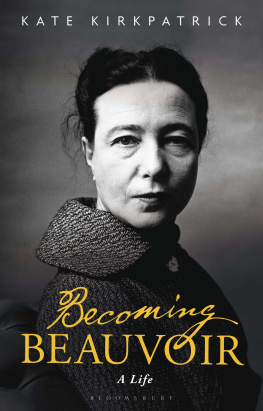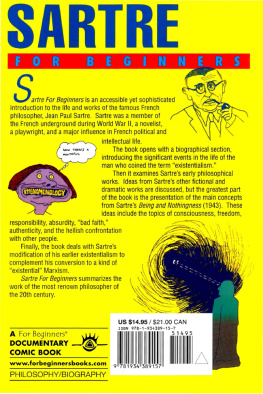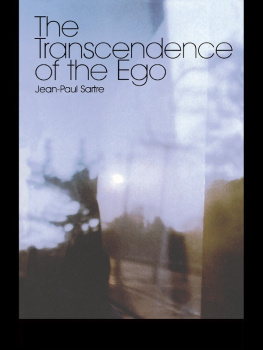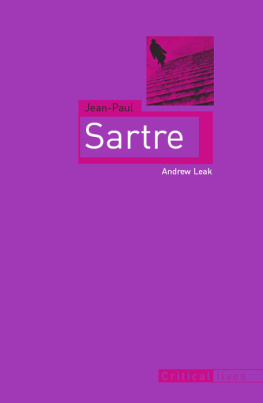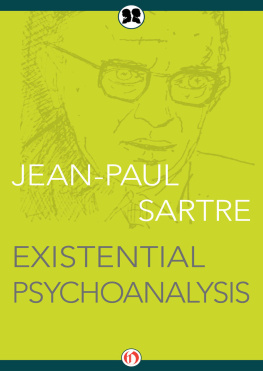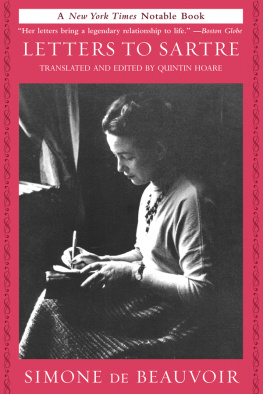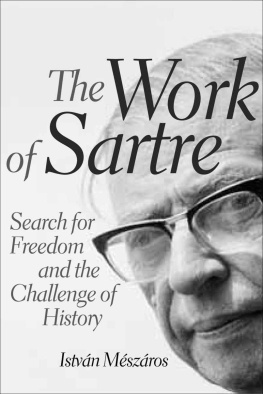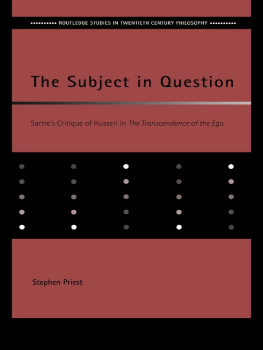Sartre and Theology
PHILOSOPHY AND THEOLOGY SERIES
Other titles in the Philosophy and Theology series include:
Adorno and Theology, Christopher Craig Brittain
Arendt and Theology, John Kiess
Badiou and Theology, Frederick Depoortere
Derrida and Theology, Steven Shakespeare
Foucault and Theology, Jonathan Tran
Girard and Theology, Michael Kirwan
Habermas and Theology, Maureen Junker-Kenny
Hegel and Theology, Martin J. De Nys
Kant and Theology, Pamela Sue Anderson and Jordan Bell
Kierkegaard and Theology, Murray Rae
Levinas and Theology, Nigel Zimmerman
Lyotard and Theology, Lieven Boeve
Marion and Theology, Christina M. Gschwandtner
Merleau-Ponty and Theology, Christopher Ben Simpson
Nietzsche and Theology, Craig Hovey
Simone Weil and Theology, A. Rebecca Rozelle-Stone and Lucian Stone
Vattimo and Theology, Thomas G. Guarino
Wittgenstein and Theology, Tim Labron
iek and Theology, Adam Kotsko
Heidegger and Theology, Judith Wolfe
To MDK
Sartre and Theology
Kate Kirkpatrick
Bloomsbury Academic
An imprint of Bloomsbury Publishing Plc

CONTENTS
A book is a contingent thing, the existence and quality of which depend on many more people than are named on the title or acknowledgements page. The writing of this one owes much to Matthew D. Kirkpatrick (for support of too many kinds to list): thank you. Id also like to express my gratitude to Pamela Sue Anderson and George Pattison for their encouragement and comments on drafts of this work.
Gabriel and Amelia: thank you for the joy you bring to life.
Frequently cited works by Sartre appear in the text in the following abbreviations.
| AR | The Age of Reason, trans. Eric Sutton. London: Penguin, 2001. |
| B | Bariona, trans. Mary Mayer and Bernard Seal, ADAM International Review, nos. 3435 (1970): 3785. |
| BA | Baudelaire, trans. Martin Turnell. New York: New Directions, 1950. |
| BN | Being and Nothingness, trans. Hazel Barnes. London: Routledge, 2003. |
| E | Emotions: The Outline of a Theory, trans. Bernard Frechtman. New York: Open Road, 2012. Kindle Edition. References given in brackets indicate the relevant Kindle location. |
| EH | Existentialism Is a Humanism, trans. Carol Macomber. London: Yale University Press, 2007. |
| EJ | Jean-Paul Sartre and Benny Lvy, crits de jeunesse (Writings of youth). Paris: Gallimard, 1990. |
| EM | Lespoir maintenant: les entretiens de 1980. Paris: Verdier, 1991. |
| G | Saint Genet: Actor and Martyr, trans. Bernard Frechtman. London: Heinemann, 1963. |
| HN | Jean-Paul Sartre and Benny Lvy, Hope Now: The 1980 Interviews, trans. Adrian van den Hoven. Chicago: University of Chicago Press, 1996. |
| I | The Imaginary, trans. Jonathan Webber. London: Routledge, 2004. |
| IF | LIdiot de la famille, 2 vols. Paris: Gallimard, 1971. |
| M | Limage dans la vie psychologique: rle et nature (The image in psychological life: role and nature), mmoire, unpublished MS held at ITEM, Paris: cole Normale Suprieur. |
| NA | Nausea, trans. Robert Baldick. London: Penguin, 2000. |
| NE | No Exit, trans. Stuart Gilbert. New York: Vintage, 1989. |
| TE | The Transcendence of the Ego, trans. Andrew Brown. London: Routledge, 2011. |
| W | Words, trans. Irene Clephane. London: Penguin, 2000. |
| WD | The War Diaries: November 1939March 1940, trans. Quintin Hoare. New York: Pantheon, 1984. |
Philosophia, omnium mater artium, quid est aliud nisi donum aut inventum Dei?
(Philosophy, mother of all the arts what else is it if not a gift or discovery of God?)
CICERO
Jean-Paul Sartre may seem an unlikely candidate for a series on philosophy and theology. First, there is the obvious matter of his atheism. Second, Sartres personal proclivities for polyamory, grooming, questionable politics and so on made him the subject of many ad hominem attacks by Christian theologians, some of whom cast him as godless immorality personified. What could Sartre know about, or contribute to, theology? As one Parisian academic exclaimed when informed of the current volume, Sartre didnt have a theological formation!
Unlikely or not, this book demonstrates that Sartre was influenced by and influenced theology. Many theological thinkers found him worthy of study: in addition to the theologians to be considered in Being and Nothingness, first published in 1943, went through five editions in its first three years and has never been out of print since. Although by the time of Sartres death in 1980 his fame had faded, 50,000 mourners nevertheless followed his casket through Paris to its resting place in Montparnasse.
This book is primarily concerned with Sartres intellectual, rather than personal, history. Although contains a brief outline of Sartres life, the aim of this chapter is to prepare the reader for the following chapters by situating them in Sartres historical context and intellectual development. Because my argument is that there is bidirectional influence of theology on Sartre and of Sartre on theology it is necessary to consider the climate of Sartres philosophical and literary formation.
Since Tertullians famous question What has Athens to do with Jerusalem? different generations in varied historical and geographical contexts have had to ask themselves where to draw the lines between, and how to assess the legitimacy of the claims of, philosophy and theology. And in France in the first half of the twentieth century, the lines were drawn differently than they are in the Anglo-American context of today.
Whether my reader is a philosopher of no religion or a theologian who shares Tertullians suspicion of philosophy, therefore, the following shines new light on both Sartre and theology. For philosophers, understanding the pre-phenomenological theological influences on Sartres thought may illuminate some of the interpretive questions concerning his much-discussed reception of les trois Hs Hegel, Husserl and Heidegger. And for theologians, this work will show the aetiology of the oft-noted religious overtones of Sartres philosophy and demonstrate through analyzing several twentieth-century theologians treatments of Sartre the fascination he held for his theological contemporaries and successors.
Before turning to Sartres life in , however, it is worth laying one personal matter to rest. I have said already that this book is concerned with Sartres ideas, but it seems worth stating clearly at the outset what I understand to be the case about Sartre and God before we get to the question of Sartre and theology. That Sartre was an atheist is well known. But there are many varieties of atheism, and Sartres though perhaps one of the best documented in recent history is nevertheless also one of the most ambiguous.
Sartre and God
Recent scholarship has seen a small flurry of interest in Sartres atheism, with papers in both French and English treating its nature, origins and duration. But what emerges from their analyses is by no means clear cut. Although some authors are happy to assert that Sartre never wavered ... from a complete rejection of God as both philosophically problematic and existentially irrelevant to human life,


